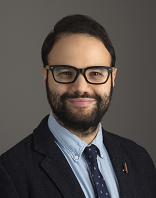Fellows
Matthew Burke, MD

Matthew Burke, MD
Sidney R. Baer, Jr. Foundational Fellow in the Clinical Neurosciences
Education History: M.D, University of Toronto B.Sc. (Honors), Life Sciences, Queen's University
Clinical Training: Neurology Residency, University of Toronto, Canada
Research Interests: Ever since my undergraduate studies, I have had strong interests in neurology, psychiatry and the expanding interface in between. This has led to a variety of research projects in fields of headache, concussion, neuropsychiatry, stroke, addiction and memory. In the latter half of my neurology residency, I became very interested in neuroplasticity and non-invasive brain stimulation. I initiated projects investigating neurostimulation strategies for the treatment of functional neurological disorders and rTMS for migraine prevention.
With regards to future research, I am interested in continuing to explore neurostimulation-based applications towards the previously mentioned fields but also towards areas such as concussion, stroke rehabilitation and cognitive impairment. I believe there is great potential not only for treatment but also for utilizing neurophysiology to further understand the pathogenesis of these conditions.
Clinical Interests: My clinical interests include concussion/traumatic brain injury, cognition/memory, headache/pain, neuropsychiatry and neurorehabilitation.
Personal Interests/Hobbies: I enjoy playing sports (such as tennis and soccer), all things food, live music and design/architecture.
Personal Goals: During my fellowship, I hope to become a technical expert in the use of non-invasive brain stimulation devices. This includes acquiring both essential design and analysis skills but also novel approaches such as pairing brain stimulation concurrently with other interventions and using real-time/closed-loop EEG and/or fMRI guided stimulation. In parallel, I hope to apply this skill-set across a variety of clinical research areas at the neurology/psychiatry interface. I believe that these technologies will be a “game-changer” for the clinical neurosciences and I am eager to be a part of the innovation and advancement of this field.
Selected Research Publications:
- Burke MJ, Lamb MJ, Hohol M, Lay C. Unique CT perfusion imaging in a case of HaNDL: new insight into HaNDL pathophysiology and vasomotor principles of cortical spreading depression. Headache. 2017;57(1):129-134.
- Burke MJ, Fralick M, Nejatbakhsh N, Tartaglia MC, Tator CH. In search of evidence-based treatment for concussion: characteristics of current clinical trials. Brain Inj. 2015;29(3):300–305.
- Burke MJ, Ghaffar O, Staines WR, Downar J, Feinstein A. Functional neuroimaging of conversion disorder: The role of ancillary activation. NeuroImage: Clin. 2014;6:333-339.
- Burke MJ, Chundamala J, Tator CH. Deficiencies in concussion education in Canadian medical schools. Can J Neurol Sci. 2012;39(6):763-766.
- Burke MJ, Vergouwen MD, Fang J, Swartz RH, Kapral MK, Silver FL, Casaubon LK. Short-term outcomes after symptomatic internal carotid artery occlusion. Stroke. 2011;42:2419-2424.
Selected Abstract/Conference Presentations:
- Gros P, Chen R, Feinstein A, Lang AE,Burke MJ. Neurostimulation for the treatment of functional neurological disorders: novel therapeutic strategy or placebo effect? 2nd International Brain Stimulation Conference, Barcelona, Spain March 2017.
- Burke MJ, Beyaert M, Blichowski, Lay C, Blumberger DM, Lena S. rTMS for migraine prevention: evaluating rationale for location and frequency of stimulation. 1st International Brain Stimulation Conference, Singapore, March 2015.

